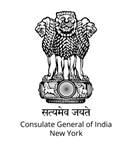Menu
- Permanent Mission of India to UN
- Permanent Mission of India to CD
- Permanent Mission of India to WTO
- Consulate General of India
- Working hours
- Holidays
- Finding / Contacting Us
- Consular, Passport and Visa Services
- Government of India Simplifies process for re-issue of OCI Cards
- Ministry of Home Affairs Notification
- Commercial Representative
- ADVISORY
- New Passport Rules
- Customs & Baggage guide for Travellers
- FAQ on Marital disputes involving NRI/POI spouses
- VISA REFUND POLICY
- Voting Rights to Overseas Electors
- EAM's message on PSP Divas
- Statements












